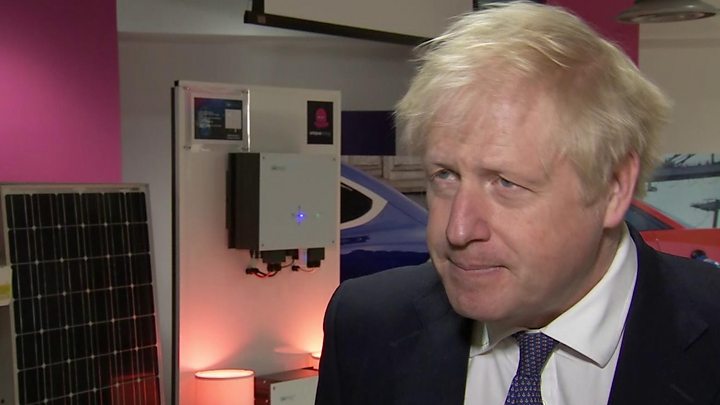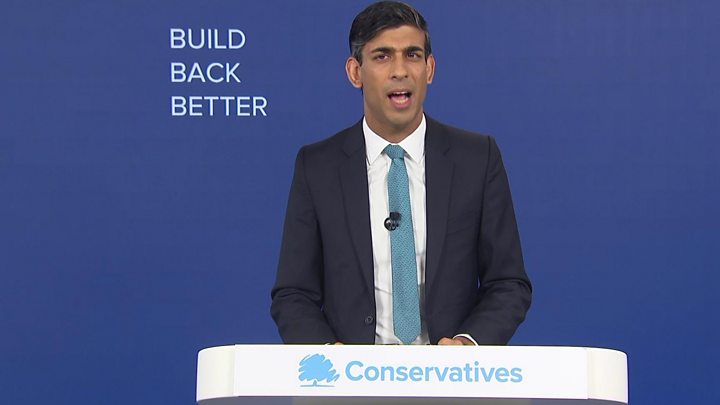An investigation is under way after nearly 16,000 coronavirus cases went unreported in England, delaying contact tracing efforts.
Downing Street said there was a "technical issue" when positive test results were transferred from labs to central dashboards.
Public Health England said 15,841 cases between 25 September and 2 October were left out of the UK daily case figures.
Those who tested positive were informed - but their close contacts were not.
Experts advise that ideally contacts should be tracked down within 48 hours.
The issue has been fixed, PHE said, with outstanding cases passed on to tracers by 01:00 BST on Saturday.
On Monday afternoon, the government's coronavirus dashboard said that there had been a further 12,594 lab-confirmed cases of coronavirus in the UK, bringing the total number of cases in the UK to 515,571.
Another 19 people were reported to have died within 28 days of testing positive for Covid-19.
The prime minister's spokesman said the IT glitch was "quickly resolved" and NHS Test and Trace and PHE were "urgently contacting" all cases, with extra contact tracers being used.
However, he said an investigation has been launched into why the problems were not picked up sooner.
The technical issue meant the daily case totals reported on the government's coronavirus dashboard over the past week have been lower than the true number.
BBC health editor Hugh Pym said daily figures for the end of the week were "actually nearer 11,000", rather than the roughly 7,000 reported.
Labour described the glitch as "shambolic".
It was caused by some data files exceeding the maximum size, and issues in transfer of data between NHS Test and Trace and PHE.
Health Secretary Matt Hancock is due to update Parliament on Covid-19 on Monday afternoon.
Prime Minister Boris Johnson said the cases data had been "truncated" and "lost", but added all people who had tested positive had been contacted, with tracers were "now working through all the contacts".

Media playback is unsupported on your device
BBC analysis found the number of cases reported for the week to 1 October increased by 92.6% in the North West after taking in the missing tests - with similar rises reflected across England.
The increase, of 8,348 cases, is mostly down to the missing tests, but the figures also included some results which came back after 2 October.
The BBC has confirmed the missing Covid-19 test data was caused by the ill-thought-out use of Microsoft's Excel software. Furthermore, Public Health England (PHE) was to blame, rather than a third-party contractor.
The issue was caused by the way the agency brought together logs produced by the commercial firms paid to carry out swab tests for the virus.
They filed their results in the form of text-based lists, without issue.
PHE had set up an automatic process to pull this data together into Excel templates so that it could then be uploaded to a central system and made available to the NHS Test and Trace team as well as other government computer dashboards.
The problem is that the PHE developers picked an old file format to do this - known as XLS.
As a consequence, each template could handle only about 65,000 rows of data rather than the one million-plus rows that Excel is actually capable of.
And since each test result created several rows of data, in practice it meant that each template was limited to about 1,400 cases. When that total was reached, further cases were simply left off.
Until last week, there were not enough test results being generated by private labs for this to have been a problem - PHE is confident that test results were not previously missed because of this issue.
And in its defence, the agency would note that it caught most of the cases within a day or two of the records slipping through its net.
To handle the problem, PHE is now breaking down the data into smaller batches to create a larger number of Excel templates in order to make sure none hit their cap.
But insiders acknowledge that their current clunky system needs to be replaced by something more advanced that does not involve Excel.
Public Health England's interim chief executive Michael Brodie said a "technical issue" was identified overnight on Friday, 2 October in the process that transfers Covid-19 positive lab results into reporting dashboards.
"We fully understand the concern this may cause and further robust measures have been put in place as a result," he said.
PHE said NHS Test and Trace has made sure there are enough contact tracers working, and is working with local teams to ensure they also have sufficient resources to be urgently able to contact all cases.
The number of call attempts is being increased from 10 to 15 over 96 hours.
There have been clear problems with the government's Test and Trace data, but they do not change our view of the UK's trajectory.
Cases surged at the beginning of September, they may still be climbing, but not as quickly as anticipated just a few weeks ago.
This perspective comes from three key sets of data - the Office for National Statistics, the React study by Imperial College London and the Covid symptom tracker app.
None are blighted by either the current issues with the Test and Trace data or by people struggling to access a test.
The real fallout of the weekend's statistical chaos is not the numbers, but the people who should have been contact-traced, told to quarantine and instead may have been unwittingly passing on the virus.
Labour's shadow health secretary Jonathan Ashworth said: "This is shambolic and people across the country will be understandably alarmed."
He called for Health Secretary Matt Hancock to explain "what on earth has happened" and what he plans to do to fix test and trace.
Bridget Phillipson, shadow chief secretary to the treasury, told BBC Breakfast she wanted to know whether it had had "any impact on government decision making around local restrictions".
PHE data shows Manchester now has the highest rate of infection in England, at 495.6 cases per 100,000 people in the week to 1 October, from 223.2 the week before.
Liverpool has the second highest rate, up to 456.4 from 287.1 per 100,000. Knowsley in Merseyside, Newcastle, Nottingham, Leeds and Sheffield have also seen sharp rises.
Getty Images
From 25 Sept to 2 Oct
50,786 Cases initially reported by PHE
15,841 Unreported cases, missed due to IT error
8 days of incomplete data
1,980cases per day, on average, were missed in that time
48 hoursIdeal time limit for tracing contacts after positive test
- 'PROFESSOR LOCKDOWN': How worried is Neil Ferguson about the spread of this pandemic?
- LONG COVID: What's the science behind the long term symptoms?
Have you recently tested positive? Have you been contacted by test and trace? Share your experiences by emailing haveyoursay@bbc.co.uk.
Please include a contact number if you are willing to speak to a BBC journalist. You can also get in touch in the following ways:
- WhatsApp: +44 7756 165803
- Tweet: @BBC_HaveYourSay
- Please read our terms & conditions and privacy policy
If you are reading this page and can't see the form you will need to visit the mobile version of the BBC website to submit your question or comment or you can email us at HaveYourSay@bbc.co.uk. Please include your name, age and location with any submission.
https://news.google.com/__i/rss/rd/articles/CBMiJmh0dHBzOi8vd3d3LmJiYy5jby51ay9uZXdzL3VrLTU0NDIyNTA10gEqaHR0cHM6Ly93d3cuYmJjLmNvLnVrL25ld3MvYW1wL3VrLTU0NDIyNTA1?oc=5
2020-10-05 15:13:26Z
52781101992260

